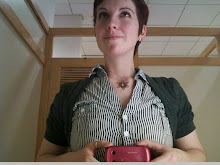"Sisterhood is powerful, the personal is political, women do not trash women..."
-Kaplan and Rose (quoted in "Women and Leadership" book by Jean Lau Chin)
Friday, February 25, 2011
Posted by Starr B at 10:54 PM 0 comments
Thursday, February 24, 2011
Weekly Activism Log for Service Learning- Week 1
1. Activism: This week my team and I had our first meeting with our community partner. We completed the proposal last week, which specified the game plan of the "What's in Your Wallet?" event-who was taking part, who the community partner was, and a time-line of our future meetings.
During the meeting we were successful in gathering more information on the teaching plan for the event (in particular, the main activity of our event and how we could specialize it towards the theme of leadership). We also took the meeting time to set the next deadline for our event-submitting prompts and discussion questions to ask the group of attendees at our event. A pitfall was communication with e-mail, leading to some frustration, confusion, and a mildly imbalanced work load.
During the next week the team will finish the teaching plan, perform a dry run of the event, and then lead the event next Wednesday.
2. Reflection: Being involved this week in a collaborative style has indeed make me think about how it could help out leaders all the time to be able to work well with others-disregarding the idea that it's simply a "woman's style" of leading and that is the only way they lead. We are conducting an event with college students, who commonly are the subject of experiments dealing with thoughts on leadership, and acts of prejudice. In the book "Through the Labyrinth" Alice Eagly and Linda Carli note that "when groups are viewed in new roles, people's spontaneous mental associations about them change to correspond to these roles" (Eagly 89). If we can help the attending college students both see women leading this event, and ask them to see how many types of people and potential leaders there are out there, then I feel we will have done a good job.
3. Reciprocity: This opportunity to aid the community (specifically a community close to me and at the center of campus, college students) will also aid my skills of leading, analyzing, encouraging, and constructing an outlet for positive change when it comes to leadership and the reduction of obstacle-inducing stereotypes.
I predict that the whole process of planning, constructing, and performing an event to increase awareness of all types of great leaders for the next generation will help me to feel powerful and awesome for taking part and working towards such a noble goal.
Posted by Starr B at 10:47 PM 0 comments
Thursday, February 17, 2011
Service Learning Proposal
Contact Information:
February 17, 2011
Meredith Tweed
Address:
Propose a plan:
To be an effective leader is to be able to work well with others; a leader must understand the strengths and weaknesses of the community they are leading as well as their own. According to studies done by Dale et. al on information retention rate of individuals, when someone only hears the information they only retain 10% of it, when they hear it and see it they retain 30% of it, and when they hear it, see it, and experience it the retention rate all of a sudden jumps to 90%. To maximize retention, the presentation must be hands on. First we as a group will "unpack" our own wallets then analyze each other’s identities and guess our own strengths and weakness, incorporating auditory and visual learning. Then we will have the audience (with us included) do the same exercise. We will have the group compete to accomplish a certain task that will allow them work together and use everyone's ability. We will then ask them what they have learned about themselves and each other, and how they can use what they learned to better themselves as leaders. We want to educate tomorrow’s leaders about themselves, while encouraging the understanding of others.
Rationale:
Posted by Starr B at 7:53 PM 0 comments

